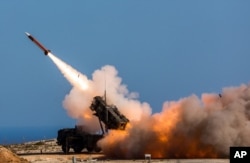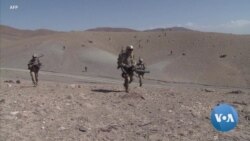The United States is sending additional troops to the Middle East to protect American forces from potential Iranian threats, President Donald Trump announced Friday.
"They're mostly in a protective capacity," he told reporters in response to a VOA question.
Acting Defense Secretary Pat Shanahan said the additions to the region would include "a Patriot battalion to defend against missile threats; additional intelligence, surveillance and reconnaissance aircraft; an engineer element to provide force protection improvements throughout the region; and a fighter aircraft squadron to provide additional deterrence.
"The additional deployment to the U.S. Central Command area of responsibility is a prudent defensive measure and intended to reduce the possibility of future hostilities," Shanahan added.
Speaking to reporters at the Pentagon, Navy Rear Adm. Michael Gilday said that the actual deployment would be about 900 additional troops. He said 600 service members included in the president's and defense secretary's statements were men and women currently in the region, but whose deployments were being extended for additional protection. Gilday said they were attached to a Patriot missile battalion in the Middle East.
WATCH: Video report by Patsy Widakuswara at the White House.
The request for more protection came from the U.S. Central Command chief, Marine Gen. Kenneth "Frank" McKenzie. Shanahan said Thursday that the request was part of a "normal back and forth" with CENTCOM, but added that it was "at a higher-elevated level, given all the dynamics there in the Middle East."
Apparent skepticism
Ahead of a security briefing on the Iranian threat Thursday, Trump appeared skeptical that additional troops would need to be deployed.
"I don't think we're going to need them. I really don't," Trump said before adding, "I would certainly send troops if we need them."
Some Democrats in Congress have disagreed with the military escalation, with Virginia Democratic Sen. Tim Kaine criticizing the "very bellicose tweets from the president" and warning that it would "be a colossal disaster if the United States were involved in Iran."
Tensions between Tehran and Washington have been escalating since Trump announced his decision to try to cut Iran's oil exports to zero and beef up the U.S. military presence in the Persian Gulf in response to what he said were Iranian threats.
"Iran has been a very dangerous player, very bad player. They are a nation of terror, and we won't put up with it," Trump said Thursday.
'Try respect'
Iranian Foreign Minister Mohammad Javad Zarif responded recently to what he called "genocidal taunts" by saying that "Iranians have stood tall for a millennia while aggressors all gone," including Genghis Kahn and Alexander the Great. "Try respect. It works," Zarif tweeted.
Last week, Trump told Shanahan that he did not want to go to war with Iran.
Sending additional U.S. troops to the region would mark a shift in position for Trump, who has repeatedly said in the past he wanted to reduce the number of U.S. troops in the region.
Last December, Trump announced the withdrawal of 2,000 U.S. troops from Syria. In February, however, he decided to keep a few hundred troops there.









